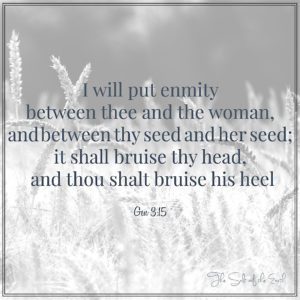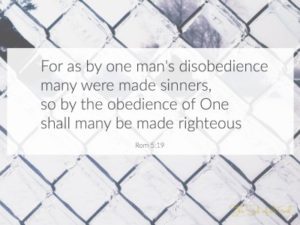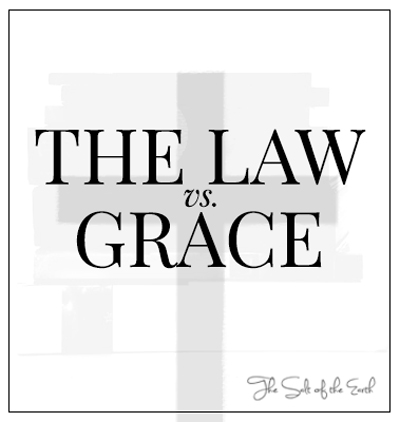N'ime blọọgụ gara aga a tụlere ozi-ọma nke oge a, nke ị na-agaghị agbanwe agbanwe na ihe niile kwere. Omume niile, gụnyere mmehie, a na-anabata ma nabata, n’ihi ihe a na-akpọ ịhụnanya nke Chineke na amara nke Chineke. Ihe niile bụ site na amara na ya mere na ị gaghị agbanwe. Ị nwere ike ịnọ, naanị otu ị dị, na-ebikwa otú ị chọrọ ibi ndụ. Mana nke a ọ bụ eziokwu? Gịnị bụ amara dị ka Akwụkwọ Nsọ? Gịnị ka amara Chineke pụtara maka ndụ Ndị Kraịst a mụrụ ọzọ? Ọ bụrụ na ị gaghị agbanwe n'ihi amara nke Chineke, gini mere ndi-amuma mere, ndịozi, na Jizọs kpọrọ ndị mmadụ ka ha chegharịa na-ekwu banyere iwepụ mmehie na ibi ndụ dị nsọ?
Ọ̀ bụ na Jizọs na ndịozi ya bụ ndị ụgha?
Ndịozi ahụ biri n’otu oge nke mmụọ nsọ nke amara ka anyị bi na ya, na n'ime. N'akwụkwọ ozi ha, nke e dere mgbe ọnwụ na mbilite n’ọnwụ nke Jisus Kraịst gasịrị na mgbe ọbịbịa nke Mụọ Nsọ gasịrị, ọ bụghị nanị na ha degaara ndị kwere ekwe okwu dị nro na nke na-agba ume, ma ha dere n'ụzọ bụ́ isi mgbazi, ịdọ aka ná ntị, mwepụ nke mmehie, na-ewepụ agadi nwoke ahụ, ido nsọ na oku ibi ndu di nsọ (Gụọ kwa: Otu esi ewepụ agadi nwoke ahụ? na Otu esi etinye nwoke ọhụrụ ahụ?)
N’akwụkwọ Mkpughe, nke e dere kwa mgbe ọnwụ na mbilite n’ọnwụ nke Jisus Kraịst na mgbe ọbịbịa nke Mụọ Nsọ gasịrị, Ọ bụghị nanị na Jizọs kwuru okwu dị nro gbasara ya na Nzukọ-nsọ Ya, ma Jisus chere omume ha na ọrụ ha ihu ndị kwere ekwe nke ụka asaa ahụ wee kpọọ ha ka ha chegharịa (Gụọ kwa: Oku nchegharị) .
Ọ̀ bụ na Jizọs na ndịozi ya bụ ndị ụgha?
Ọ bụrụ na amara nke Chineke ga-adị ka amara nke Chineke, nke a na-ekwusa taa, site na ị gaghị agbanwe ma nwee ike ibi ndụ dịka ịchọrọ ibi ndụ, mgbe ahụ, nke ahụ pụtara na Jizọs na ndịozi ya gwara ndị kwere ekwe ụgha, onye bụ onye Ụka; aru nke Kraist.
N'ihi na ọ bụrụ na ndị kwere ekwe agaghị agbanwe mgbe a mụsịrị ha ọzọ, gịnịzi mere Jizọs na ndịozi ya ji gwa ha ọrụ ha? Gịnịkwa mere ha ji nye ha iwu ka ha gbanwee àgwà ha na ijegharị ha? Onye na-ekwu eziokwu? Jizọs na ndịozi ya ma ọ bụ ndị nkwusa na ndị ozizi nke oge a?
Ọ bụrụ na amara Chineke ga-anabata ma nagide ụdị omume ọ bụla, ọ bụrụgodị na ọ na-emegide Okwu ahụ, na agaghị ejide ndị kwere ekwe na-aza ajụjụ maka okwu ha na ọrụ ha, mgbe ahụ Jizọs na ndịozi ya agaghị agbazi ndị kwere ekwe. Naanị ha ga-asị "Emere nke ọma, na-aga n'ihu!”
Ma Jizọs na ndịozi ya ekwughị otú ahụ, ma dọrọ ha aka ná ntị ma chee ha okwu ha, na-arụ ọrụ na ndụ ma na-agwakarị ụka okwu ike, dika Jisos kwuru okwu siri ike n'oge ijeghari n'uwa a, mgbe o bilitesịrị n’ọnwụ na n’oge ọ pụtara n’ihu Jọn n’ime Akwụkwọ nke Mkpughe.
Na ndabere nke okwu Jizọs n'oge ọ na-eje ije n'ụwa na mgbe ọnwụ na mbilite n'ọnwụ na ọchịchị ya, anyị nwere ike ikwubi na ọ bụrụ na mmadụ bụ nke Jizọs ma chọọsoro Ya, mgbe ahụ, onye ahụ apụghị ịnọgide na-adị ndụ n'ụdị anụ ahụ ma nọgide na-adị ndụ n'ime mmehie ma ọ dịghị mkpa ịgbanwe, meekwa ihe (s)ọ chọrọ ime. N'ihi na ụbọchị ga-abịa mgbe onye ọ bụla, tinyere ndị kwere ekwe, ga-eguzo n'ihu ocheeze ya, a ga-ekpekwa ya ikpe dịka……. ọrụ ha (2 Ndị Kọrịnt 11:15, Mkpughe 20:12-15).
Nke ahụ pụtara na ọrụ dị mkpa na otú mmadụ si ebi ndụ na ihe mmadụ na-eme, mee ihe dika Okwu ahu siri di.
Ma gịnị na-eme amara nke Chineke, nke onye ọ bụla na-ekwu maka ya, pụtara? Iji gbochie blọọgụ a ka ọ ghara ịdị ogologo nke ukwuu, a ga-atụle isiokwu a n'ọtụtụ blọgụ.
Gịnị bụ amara?
N'ọgbụgba-ndụ ọhụrụ ka a tụgharịrị n'amara site n'okwu Grik 'χάρις', mba 5485 (SC) nke pụtara: amara, ọnọdụ obiọma na ihu ọma n'ebe mmadụ nọ, mgbe mgbe na-elekwasị anya na uru e nyere ihe ahụ; site na ndọtị: onyinye, uru;kredit; okwu ebere na uru: daalụ, ngozi:- amara amara, daalụ, daalụ, obi ụtọ, dị mma, uru, onyinye, amara, nnwere onwe, daalụ, daalụ kwesịrị.
Amara pụtara, na ị na-enweta ihe na-enweghị ịrụ ọrụ maka ya. N'ihi na eziokwu, na ị gaghị eme ihe ọ bụla maka ya, ị gaghị enweta ya. Ya mere amara bụ amara na-enweghị isi. N'ihi na ozugbo i nwetara ya site n'ọrụ gị ọ bụghịzi amara, mana uru nke gị (Ndị Rom 11:5-6).
Nke a na-emetụtakwa amara nke Chineke. Amara nke Chineke na-egosi anyị ịdị mma Chineke, ebere, na ịhụnanya n'ebe ndị mmadụ nọ na-agụnye ndị zuru okè ọrụ nke mgbapụta nke Jisus Kraịst na mgbapụta na mweghachi nke mmadụ dara ada, onye ya na Chineke dị ná mma ma nwetawo ohere ịbanye n’alaeze Chineke site n’ịmụghachi.
Naanị site n'okwukwe, ị nwere ike bụrụ ndị na-eketa amara nke Chineke. Site n’okwukwe na Jisus Kraịst na ọrụ mgbapụta Ya na site na nchegharị na mmeghari ohuru, ị bụ onye ezi omume na Chineke nabatara gị. Agụghị gị n'onye ezi omume ma mee ka ị dị nsọ na ezi omume site n'ọrụ nke gị kama site n'ọrụ nke Jizọs Kraịst. Site na mmụgharị n’ime Kraịst, unu abụrụla ndị na-ekere òkè n’ụdị dị nsọ nke Chineke (Ndị Rom 4:16-17, Taịtọs 3:5-7, 2 Pita 1:4).
Onye ọ bụla nọ n'ụwa a enyela nnwere onwe ime nhọrọ nke ịbụ onye kere òkè n'amara nke Chineke ma ọ bụ na ọ gaghị..
Amara nke Chineke; nkwa nke Mesaịa ahụ
N'ime ogige Iden, mgbe mmadụ mehieworo, ya mere e si daa n’ọkwa ahụ nke Chineke nyeworo mmadụ, Chineke kwere nkwa nke (ime mmụọ) mweghachi nke nwoke dara ada, nye madu na nkpuru-ya (ụmụ). Chineke kwere nkwa na ya ga-etinye iro n’etiti agwọ ahụ na nwanyị ahụ nakwa n’etiti mkpụrụ ya na Mkpụrụ ya nakwa na ọ ga-echifịa ya isi. (Gen 3:15). Mkpụrụ ahụ zoro aka na Jizọs Kraịst.
Site na Nkwa ya, Chineke gosiri amara ya; Ebere ya na ịdị mma ya, n'ihi na mmadụ ekwesịghị ya. Ọ dị mkpa ịmara, na Adam abụghị nke ụmụ Izrel nke anụ arụ. Adam bụ nwa Chineke, mbụ mmadụ n’ụwa a, na nna onye dara ada; ndi nmehie.
N'ihi ya nnupụisi n'okwu Chineke, Adam dara n’ọkwa ahụ Chineke nyere mmadụ, na n’ihi nke ahụ mmụọ ya, nke jikọtara ya na Nna ahụ, nwụrụ ma ya mere Adam kewapụrụ n'ụzọ ime mmụọ n'ebe Chineke nọ.
Mmadụ ghọrọ mkpụrụ obi dị ndụ nke nwere aru na mkpụrụ obi (anụ ahụ).
Ndị ahụ, onye ga-amụ site na mkpụrụ nke mmadụ, a ga-amụ dịka nwoke dara ada; onye nmehie. Ọ dịghị onye e wepụrụ! Ọ bụ ya mere Chineke ji kwuo, na Mkpụrụ nke nwanyị ahụ ga-echifịa isi ekwensu. Ebe ọ bụ na ọ dịghị onye, onye ga-amụ site na mkpụrụ nke mmadụ wee mụọ dịka onye mmehie, ga-enwe ike ichifịa isi ekwensu ma napụ ikike ya. N'ihi na onye ọ bụla, onye amuru dika onye-nmehie bi n’okpuru ikike ekwensu (onyeisi ndị mmụọ ozi dara ada) ma edobere ya n’okpuru ndị mmụọ ozi.
N'ime ogige Iden Chineke kwere nkwa mweghachi nke mmadụ dara ada na ime n'etiti Chineke na mmadụ. Mmadụ erughị eru ya, na agaghị enwe ike iru eru ya, ma Chineke kwere nkwa, we mezu nkwa-Ya. N’ihi oke ihunanya Ya, ịdị mma, na ebere, O nyere Ọkpara ọ mụrụ naanị Jizọs Kraịst ka ọ gbapụta mmadụ dara ada wee weghachi ọnọdụ nke mmadụ dara ada (Jn 3:16).
Ị pụghị inweta amara site n'ọrụ
N'ihi na mmadụ nile emehiewo, unu ewe ghara idi ebube Chineke; Agēwere kwa amara-Ya gua onye ezi omume n'efu site na nb͕aputa ahu nke di nime Kraist Jisus: Onye Chineke weputara ka ọ buru ihe-nmehie site n'okwukwe n'ọbara Ya, ikwusa eziomume Ya maka mgbaghara mmehie ndị gara aga, site na ntachi-obi nke Chineke; Ikwuwapụta, M na-ekwu, n'oge a ezi omume Ya: ka O we buru onye ezi omume, na onye nāgu onye ahu nke kwere na Jisus n'onye ezi omume (Ndị Rom 3:22-26)
Onye ọ bụla, onye amuru site na nkpuru madu bu amuru dika onye nmehie. Ọ nweghị onye ewepụrụ. Onye ọ bụla, who is born on this earth in the flesh, needs redemption of his fallen nature, which is present in the flesh, including those, who belong to the carnal people of God. Because that’s the promise that God gave to His carnal people first and then to the Gentiles (Isaiah 56, Hosea 2:23, Ndị Rom 9:24-29)
The soul of fallen man lives in a body, but the spirit of fallen man (sinner) is dead and stays dead.
The fallen man (sinner) lives under the authority and rulership of the devil and his kingdom and is not able to escape his kingdom and his reign by his own works. Fallen man is not able to escape death through his own works.
There is only otu ụzọ and that is through faith in Jesus Christ, and His work, and through mmeghari ohuru.
Jesus Christ has dealt with the sin problem and sin nature that is present in the flesh of fallen man and conquered sin and iniquity at the whipping post and at the cross. Jesus became the Substitute for fallen man and has taken all the sins and iniquities, which lead to death, upon Himself and took the death penalty. So that, Jesus would enter and conquer death and reinstate the position of fallen man and reconcile man back to God.
Onye ọ bụla, who would believe in Jesus Christ, Ọkpara nke Chineke dị ndụ, repents and becomes born again, would be redeemed from death by laying down his flesh. The person would be made holy and righteous by the blood of Jesus and his spirit would be raised from the dead by the power of the Holy Spirit and receive eternal life (Ndị Rom 3:24, Ephesians 1:4-12, Taịtọs 3:5-7, 1 Pita 3:18).
That’s why Jesus had to become equal to man (identify Himself with man), so that He could become our Substitute. Only when you identify yourself with the death and resurrection of Jesus Christ, you will have peace with God and receive eternal life (Gụọ kwa: ‘Was Jesus fully Human?').
Being justified by faith in Jesus Christ
Therefore being justified by faith, we have peace with God through our Lord Jesus Christ: By Whom also we have access by faith into this grace wherein we stand, and rejoice in hope of the glory of God (Ndị Rom 5:1-2)
By faith in Jesus Christ; the Son of the living God and in His perfect ọrụ nke mgbapụta, that Jesus has accomplished at the cross, are those, who believe in Him, repent and become born again, made righteous and redeemed from death ((1 Ndị Kọrịnt 1:4, Ndị Rom 5:15, Taịtọs 3:5-7).
Through regeneration, you have crucified your flesh with its sinful nature, and in which sin dwells and causes you to persevere in sin, and by the power of the Holy Spirit, your spirit is raised from the dead. You have been redeemed from the power of the kingdom of darkness and transferred into the Kingdom of His dear Son Jesus Christ (Ndị Kọlọsi 1:13-14).
The promise of God is also for the Gentiles
It is the grace of God, that the promise of God is not only for God’s carnal people (Israel), and that God not only gave them the ability to be saved from death and be redeemed from the sinful nature of fallen man, but God also gave the ability to the Gentiles to be saved and be redeemed from the power of the devil, that reigns in the sinful nature of the flesh, and that through regeneration they’ll be reconciled to God and have received the power to become sons of God.
Everyone has been given the ability to become part of God’s people, through the circumcision in Christ (Jọn 1:12-13, Acts 4:33-34, Ndị Rom 15:15-16, Ephesians 3:6, Ndị Kọlọsi 1:6, 2 Tim 1:9-10, Taịtọs 3:4:7,1 Pita 1:10-11).
By faith in Jesus Christ and through regeneration in Christ, you have become a new creation; a new man. You have become a partaker of His divine nature by the indwelling of the Holy Spirit.
It is grace, that by faith in Jesus Christ you have been made righteous and have peace with God (Ndị Rom 5:1-2).
It is grace, that by His work of redemption, you have received His (ime mmụọ) inheritance; His Holy Spirit. It’s not by your works, what you have done, and not because you deserve it (Acts 20:32, 1 Ndị Kọrịnt 1:4-5, Galatians 1:3-5).
Because due to the fact, that the flesh contains the sinful nature, every work that derives from the flesh is evil and corrupted with sin and that’s why man will never be able to deserve nor to accomplish the state of righteousness by his own carnal works.
Through the grace of Jesus Christ, He Who was rich became poor, so that through His poverty, you could become (ime mmụọ) rich (2 Ndị Kọrịnt 8:9).
Saved by grace
But God, who is rich in mercy, for His great love wherewith He loved us, Even when we were dead in sins, hath quickened us together with Christ, (by grace you are saved;) And hath raised us up together, and made us sit together in heavenly places in Christ Jesus: That in the ages to come he might shew the exceeding riches of His grace in His kindness toward us through Christ Jesus. For by grace are you saved through faith; and that not of yourselves: it is the gift of God. Not of works, lest any man should boast (Ephesians 2:4-9).
It is the grace of God, that He made you alive in Jesus Christ and saved you.
It is the grace of God, that He has given you in Christ a place in the heavenly places and that you are seated in Him.
Now you may live in the grace of God and show God’s mercy, ịdị mma, and grace to the people around you, by preaching the gospel of grace, which is the message of Jesus Christ, the cross, and God’s perfect work of redemption, and give them the ability to come to Jesus Christ, and accept Jesus as Saviour and make Jesus Lord over their lives, so that they will be redeemed from their sin nature and saved from death. Through faith in Jesus Christ, nchegharị, and regeneration they become partakers of the grace of God.
Because that’s the gospel of grace: that every sinner, no matter what (s)he has done, may come to Jesus (Acts 20:24, 1 Pita 4:10).
The only thing, that the person has to do is to chegharịa and become born again in Christ, which means that the person will crucify and lay down his flesh so that the spirit in man can be resurrected from the dead by the power of the Holy Spirit. Because the spirit of man cannot be resurrected from the dead unless the flesh has died.
No one can earn his or her salvation. No one can be saved and be made righteous and holy by doing ‘good works’, charity work, going to church, and/or keeping the law.
Only through the grace of God and by faith in Jesus Christ, through repentance and regeneration, every sinner can be redeemed from his sinful nature and saved from death. That’s why, it’s so important to keep preaching this message of the grace of God, which is the message of the cross.
What do you do with the grace of God?
Wherefore we receiving a kingdom which cannot be moved, let us have grace, whereby we may serve God acceptably with reverence and godly fear: For our God is a consuming fire (Hebrew 12: 28-29)
But…. Now that you have found grace in God’s eyes, which means that you are saved by faith in Jesus Christ and are accepted by God and through mmeghari ohuru, you have become His son, what do you do with His grace? (Ephesians 1:5-7, Taịtọs 2:11-14)
What do you do with your new position as a son of God and what do you do with the inheritance, which you have received in Jesus Christ?
Kedu ihe ị na-eme, to show God your gratitude? Do you thank Him, honor Him, glorify Him and exalt Him with your life, by walking in His grace and after His will? (2 Thessalonians 1:12)
Or do you stay carnal and keep living for yourself and do you use the grace of God and all that you have been given for yourself, to satisfy the lusts and desires of your flesh and to build your own kingdom?
Although you are not justified and made holy and righteous by your own works but by His grace and work, the works of righteousness will follow you. Because you have been made righteous in Christ and have become a new creation in Him and have God’s nature, you will walk after the Spirit in righteousness and do righteous works.
N'ihi na eziokwu, that by faith in Jesus Christ; Okwu ahu, and by His work you have been made righteous, you shall also do what the Word tells you to do because what you do will confirm your faith. When you say that you believe, but you don’t do what the Word tells you to do and therefore become disobedient to the Word, then your faith is without works and therefore your faith is meaningless and death (Ndị Rom 4:4-5, James 2:14-26)
Ee, you have been saved by the grace of God and entered the Kindom of God, but by everything you say and do in life; your works, you decide whether to stay saved and stay in the Kingdom of God or not (Gụọ kwa: ‘Once saved always saved?').
You can’t be saved by your works and by keeping every commandment of the law, but your works do testify, to whom you belong: Jizọs, the Word and the Kingdom of God or the devil, the world and the kingdom of darkness.
'Bụrụ nnu nke ụwa'









